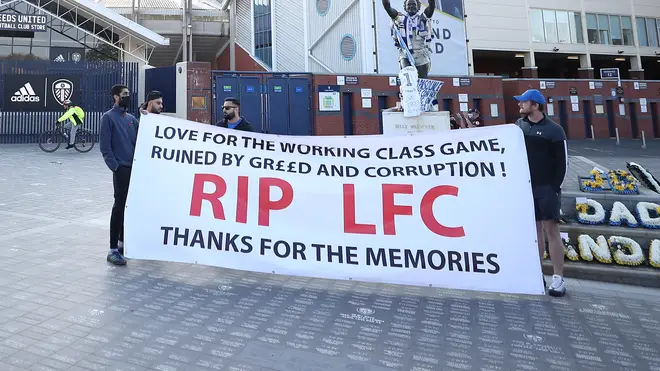
Ian Payne 4am - 7am
19 April 2021, 18:56 | Updated: 20 April 2021, 17:32

Plans for the controversial European Super League took a step forward on Sunday night, but could it prove to be an own goal for the six English sides who join the competition?
The game that so many of us love has unashamedly pursued money as its end goal for years, but the inevitable decision to create the breakaway league does nothing to mitigate the sport's move away from its working-class roots.
And it is for this very reason why not only football fans should care, but the nation should care too.
The likes of Old Trafford, Anfield and Stamford Bridge have long stood in the heart of communities that have overcome world wars, financial crises and now a global pandemic. Though players and managers come and go, two things have remained permanent: the support of football fans and the club’s connection with its local area.
Breaking away and forming a league with clubs from across the continent will mean those loyal fans will have fewer opportunities to see their beloved teams. They will be competing with new, international fans for seats at games and no doubt increased ticket prices – after all “world-class competition” will likely come at world-class prices.
Read more: Govt announces fan-led review into football amid Super League plans
Explained: European Super League: What is it and why is it so controversial?

Liverpool fan "ashamed" over club's plan to join European Super League
There is also talk of more matches being played in other countries with growing football markets. Just like American Football’s NFL moving games to the UK, one must assume something similar will be done with this competition, which will further limit the chances of a local supporter watching their side play at home. Such a move could spell the end for businesses surrounding the grounds, which rely heavily on gameday income.
Even if you hate football, the local impact could be devastating.
Fans of the 'big six' clubs - Arsenal, Chelsea, Liverpool, Manchester City, Manchester United and Tottenham Hotspur - have even taken to social media and WhatsApp groups to say they will stop supporting their team.
And the prospect of losing London derbies, the Merseyside derby and the Manchester derby to another league will devastate supporters up and down the country.
Meanwhile, lower league clubs with less stable finances could now see even less money trickling down from the Premier League as money for TV rights is siphoned into the breakaway competition.
Read more: Outrage as England's 'big six' clubs plan to join European Super League
Watch: 'Players won't stand for' European Super League, ex-Arsenal player tells LBC

Arsenal fan condemns club's 'desperate grab at European glory'
Teams that have struggled through the coronavirus pandemic will see the European Super League as another kick in the teeth for little clubs who can now never dream of replicating the astonishing achievement of Leicester City’s Premier League win five years ago.
Those stories of David beating Goliath will be a distant memory if this league goes ahead as planned. The ideas of fairness and meritocracy will be thrown aside, to be replaced by clubs who believe they have a divine right to success and a place in the elite league. Is this something we want to be teaching to kids at grassroots levels when picking up the sport?
If the Super League ensured access for smaller clubs, fans might find it easier to stomach – and in fairness, the league’s website says there will be five qualifying spots available each year.
But with those currently running the footballing world (FIFA, UEFA and several domestic leagues) unanimously coming out in opposition to the move, any club in current domestic competitions would be barred from entering the new league without serious legal, financial and competitive implications.

James O'Brien: European Super League proposal is 'greed incarnate'
At the end of the day, competition is at the heart of football. The threat of relegation and the joy of promotion are what keeps the sport interesting every year. There are stories within stories each season because of the current format.
Any team, on its day, can beat anyone.
Removing these joys and surprises from the game will sap the life out of it and giant-killings will become a thing of the past.
Ridding the sport of tales such as Wrexham beating Arsenal in the FA Cup in 1992, or Oldham overcoming a Liverpool side with the likes of Steven Gerrard and Luis Suárez in it to win 3-2 in the same competition in 2013, would be a travesty.
It would no longer be the beautiful game in its purest form.

Ex-England footballer Peter Reid tells fans: 'Don't go to the games'
Football fans have adapted to many changes over the decades, and not always quietly, but ripping their clubs away from them in the pursuit of greater financial gain and overseas supporters could prove a step too far for many.
We’ve all seen how empty grounds over the past year have impacted the sport’s entertainment value.
In fact, the old cliché of football being nothing without fans has been repeated to near-exhaustion.
So these clubs who have signed up to the new European Super League do so at their own peril.
Say what you like about football supporters, but they stand up for what they believe in and they will vote with their feet, which means we might just have to get used to seeing lots of empty seats in those iconic stadiums.